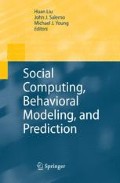Abstract
This report presents a study of integrating particle swarm algorithm, social knowledge adaptation and multi-agent approaches for modeling the social learning of self-organized groups and their collective searching behavior in an adaptive environment. The objective of this research is to apply the particle swarm metaphor as a model of social learning for a dynamic environment. The research provides a platform for understanding and insights into knowledge discovery and strategic search in human self-organized social groups, such as human communities.
Access this chapter
Tax calculation will be finalised at checkout
Purchases are for personal use only
Preview
Unable to display preview. Download preview PDF.
References
Angeline P. J. (1997): Tracking extrema in dynamic environments. In Angeline, Reynolds, McDonnell and Eberhart (Eds.), Proc. of the 6th Int. Conf. on Evolutionary Programming, LNCS, Vol. 1213 , Springer, 335–345 149
Anthony B., Arlindo S., Tiago S.(2004), MichaelO. N., Robin M. , and Ernesto C.: A Particle Swarm Model of Organizational Adaptation. In Genetic and Evolutionary Computation (GECCO), Seattle, WA, USA 12–23
Burton R., (1998): Simulating Organizations: Computational Models of Institutions and Groups, chapter Aligning Simulation Models: A Case Study and Results. AAAI/MIT Press, Cambridge, Massachusetts.
Branke, J., (1999): ”Evolutionary Algorithms for Dynamic Optimization Problems - A Survey”, Technical Report 387, Institute AIFB, University of Karlsruhe .
Branke, I., (1999): ”Memory Enhanced Evolutionary Algorithms for Changing Optimization Problems”, Proceedings of Congress on Evolutionary Computation CEC-99, pp. 1875-1882, IEEE.
Branke, J., (2002): Evolutionary Optimization in Dynamic Environments, Kluwer Academic.
Cecilia D. C., Riccardo P., and Paolo D. C., (2006): Modelling Group-Foraging Behaviour with Particle Swarms. Lecture Notes in Computer Science, vol. 4193/2006, 661–670
Clerc M. and Kennedy J., (2002): The particle swarm-explosion, stability, and convergence in a multidimensional complex space. IEEE Transactions on Evolutionary Computation, vol. 6 58–73
Cui X., Hardin C. T., Ragade R. K., Potok T. E., and Elmaghraby A. S., (2005): Tracking non-stationary optimal solution by particle swarm optimizer. in Proceedings of Software Engineering, Artificial Intelligence, Networking and Parallel/ Distributed Computing, Towson, MD, USA 133–138
Eberhart R. and Kennedy J., (1995): A new optimizer using particle swarm theory. In Proceedings of the Sixth International Symposium on Micro Machine and Human Science, Nagoya, Japan 39–43
Etaner-Uyar, Sima A., and Turgut U. H., (2004): ”An Event-Driven Test Framework for Evolutionary Algorithms in Dynamic Environments,” IEEE, pp. 2265-2272 .
Morrison R. W. and DeJong K. A., (1999): A test problem generator for non-stationary environments. In Proceedings of the 1999 Congress on Evolutionary Computation, Washington, DC, USA 2047-2053
Parsopoulos K. E. and Vrahatis M. N., (2002): Recent approaches to global optimization problems through particle swarm optimization. Natural Computing 1 235–306
Rouff C. A., Truszkowski W. F., Hinchey M. G., Rash J. L., (2004): ”Verification of emergent behaviors in swarm based systems”, Proc. 11th IEEE International Conference on Engineering Computer-Based Systems (ECBS), Workshop on Engineering Autonomic Systems (EASe), pp. 443-448. IEEE Computer Society Press, Los Alamitos, CA, Brno, Czech Republic .
Tisue S., (2004): NetLogo: A Simple Environment for Modeling Complexity. In International Conference on Complex Systems, Boston, MA
Xu J., Gao Y., and Madey G., (2003): ”A Docking Experiment: Swarm and Repast for Social Network Modeling,” .
Author information
Authors and Affiliations
Editor information
Editors and Affiliations
Rights and permissions
Copyright information
© 2008 Springer Science+Business Media, LLC
About this paper
Cite this paper
Cui, X., Pullum, L.L., Treadwell, J., Patton, R.M., Potok, T.E. (2008). Particle Swarm Social Model for Group Social Learning in Adaptive Environment. In: Liu, H., Salerno, J.J., Young, M.J. (eds) Social Computing, Behavioral Modeling, and Prediction. Springer, Boston, MA. https://doi.org/10.1007/978-0-387-77672-9_16
Download citation
DOI: https://doi.org/10.1007/978-0-387-77672-9_16
Publisher Name: Springer, Boston, MA
Print ISBN: 978-0-387-77671-2
Online ISBN: 978-0-387-77672-9
eBook Packages: Computer ScienceComputer Science (R0)

